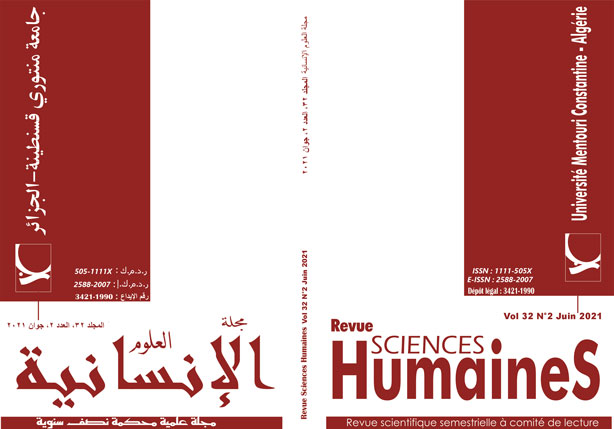Les attitudes des apprenants EFL vis-à-vis de l'utilisation de la méthode d'apprentissage coopératif dans l'apprentissage de l'expression orale
Mots-clés :
Méthode Coopératif d’apprentissage, pratiques, avis, compétence oraleRésumé
Le but de cet article est d’examiner les avis des apprenants de la langue anglaise comme langue étrangère sur l'apprentissage de la compétence orale dans le cadre de la méthode d'apprentissage coopératif. En outre, l'étude cherche à éclairer les pratiques en classe adoptées par les enseignants et les apprenants pour développer la compétence orale et considère la compatibilité de ces pratiques avec les principes de la méthode d’apprentissage coopératif. Pour atteindre les objectifs de l’étude, un questionnaire a été formulé et administré à 69 étudiants de première année de licence, département d’anglais à l’Université Mohammed Seddik Ben Yahia -Jijel. Les résultats ont révélé la propension des apprenants à adopter la méthode d’apprentissage coopératif tout en apprenant la compétence orale, bien qu’ils ne soient pas suffisamment informés sur ses cinq éléments sur lesquels se base la méthode. Par ailleurs, les pratiques des enseignants n’étaient pas parfaitement compatibles avec les principes de la méthode d’apprentissage coopératif.
Téléchargements
Références
Altamimi, N., & Attamimi, R. (2014). Effectiveness of cooperative learning in enhancing speaking skills and attitudes towards learning English. International Journal of Linguistics. Doi. 10.5296/ijl.v6i4.6114
Bailey, K. M. (2003). Speaking. In D Nunan (Ed), Practical English Language Teaching (pp.47-66). NY: McGraw-Hill Education.
Cohen, E. G. (1994) Designing groupwork. Strategies for the heterogeneous classroom (2nd edition). New York: Teachers College Press.
Doolittle, P. E. (1995). Understanding Cooperative Learning Through Vygotsky's Zone of Proximal Development TheLilly National Conference on Excellence in CollegeTeaching Columbia, SCJune 2-4, 1995.From: http://www.eric.ed.gov
Ellis, R., & Barkhuizen,G. (2005). Analyzing learner language. Oxford: Oxford University Press.
Florez, M.A.C. (1999). Improving adult English language learners’ speaking skills. Retrieved March 03, 2019, from https://files.eric.ed.gov/fulltext/ED435204.pdf.
Gillies, R.M. (2007). Cooperative Learning: Integrating theory and Practice. California: Sage Publications, Inc.
Gillies, R.M., & Ashman, A.F. (2003). Cooperative Learning: The social and intellectual outcomes of Learning in groups. London: Routledge Falmer.
Goh.C.C.M. & Burns, A.(2012).Teaching speaking: a holistic approach. Cambridge: Cambridge University Press.
Hedge, T. (2000).Teaching and Learning in the Language Classroom. Oxford: Oxford University Press.
Holliday, D.C.( 2005). Cooperate and feel great: cooperative learning training manual. Lanham, Md.: University Press of America, Inc.
Hughes, R., & Reed, B.S. (2017). Teaching and researching speaking: third edition. NY: Routledge.
Jacobs, G. M. (2004, September). Cooperative learning: Theory, principles, and techniques. Paper presented at the First International Online Conference on Second and Foreign Language Teaching and Research.
Johnson, D. W., & Johnson, R. T. (2004). Assessing students in groups: promoting group responsibility and individual accountability. Corwin Press: California.
Johnson, D. W., Johnson, R. T., & Holubec, E. J. (1993). Cooperation in the Classroom (6th ed.). Edina, MN: Interaction Book Company.
Johnson, D. W., Johnson, R. T., & Holubec, E. J. (2002). Circles of learning: Cooperation in the classroom (5th ed.). Edina, MN: Interaction Book Company.
Johnson, D.W.,& Johnson, R.T. (2008). “ Social interdependence theory and cooperative learning: the teacher’s role”. In R. M. Gillies, A. F. Ashman,& J. Terwel (Eds). ), The Teacher’s Role in Implementing Cooperative Learning in the Classroom (pp. 9-37).New York: Springer Science Business Media, LLC.
McCaFertty, S. Jacobs, G., & DaSylva Iddings, A. (2006). Cooperative Learning and second language teaching. Cambridge: Cambridge University Press.
Namaziandost, E., Neisi, L., Kheryadi, & Nasri, M. (2019). Enhancing oral proficiency through cooperative learning among intermediate EFL learners: English learning motivation in focus Cogent Education, 6:1, 1683933
Richards, J. C., & Rodgers, T. S. (2001a). Approaches and methods in language teaching. Cambridge: Cambridge University Press.
Richards, J. C., & Rodgers, T. S. (2001b). Curriculum development in language teaching. Cambridge: Cambridge University Press.
Richards, J.C. (2008). Teaching listening and speaking: from theory to practice. Cambridge: Cambridge University Press.
Slavin, R. E. (1995). Cooperative learning theory, research, and practice. Massachusetts: Simon & Schuster, Inc.
Swain, M. (1985). Communicative competence: some roles of comprehensible input and comprehensible output in its development. MA: Newbury House, 36.
Thornbury, S. (2005). How to teach speaking. Harlow: Pearson Education Limited.
Zhang, Y. (2010). Cooperative language learning and foreign language learning and teaching. Journal of Language Teaching and Research, 1, 81-83, doi
Téléchargements
Publié
Numéro
Rubrique
Licence

Cette œuvre est sous licence Creative Commons Attribution - Pas d'Utilisation Commerciale - Partage dans les Mêmes Conditions 4.0 International.












